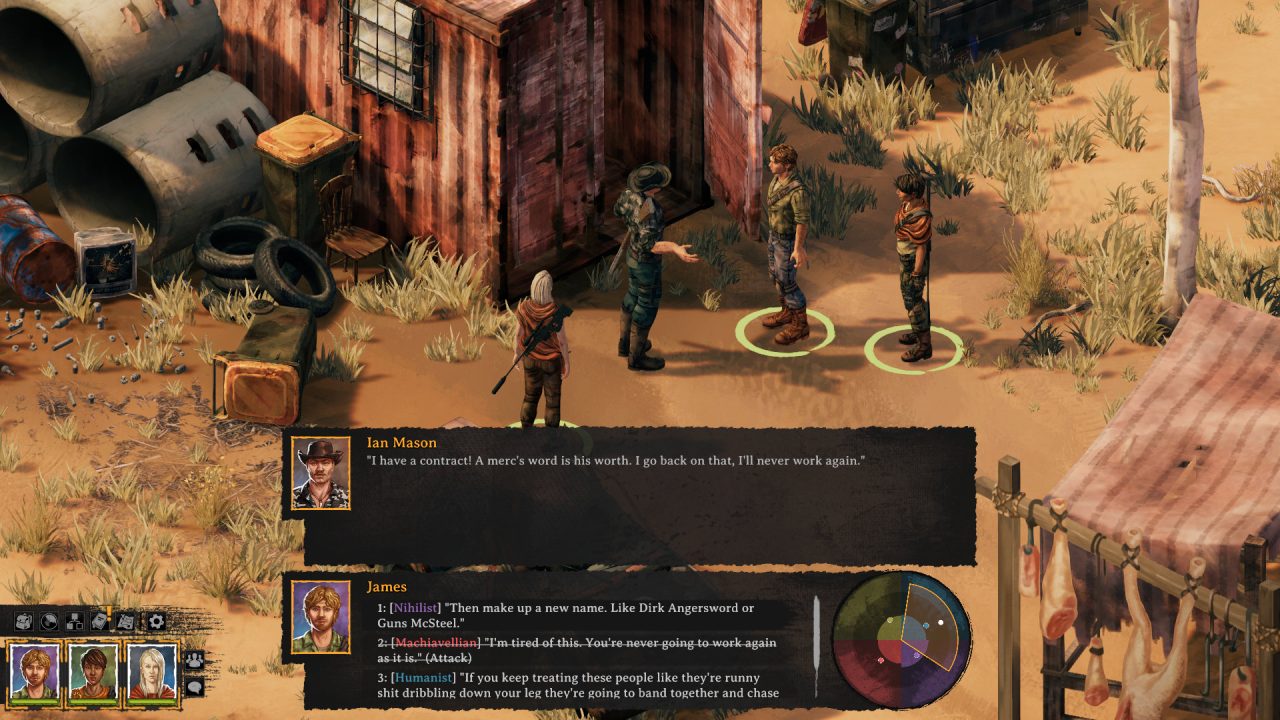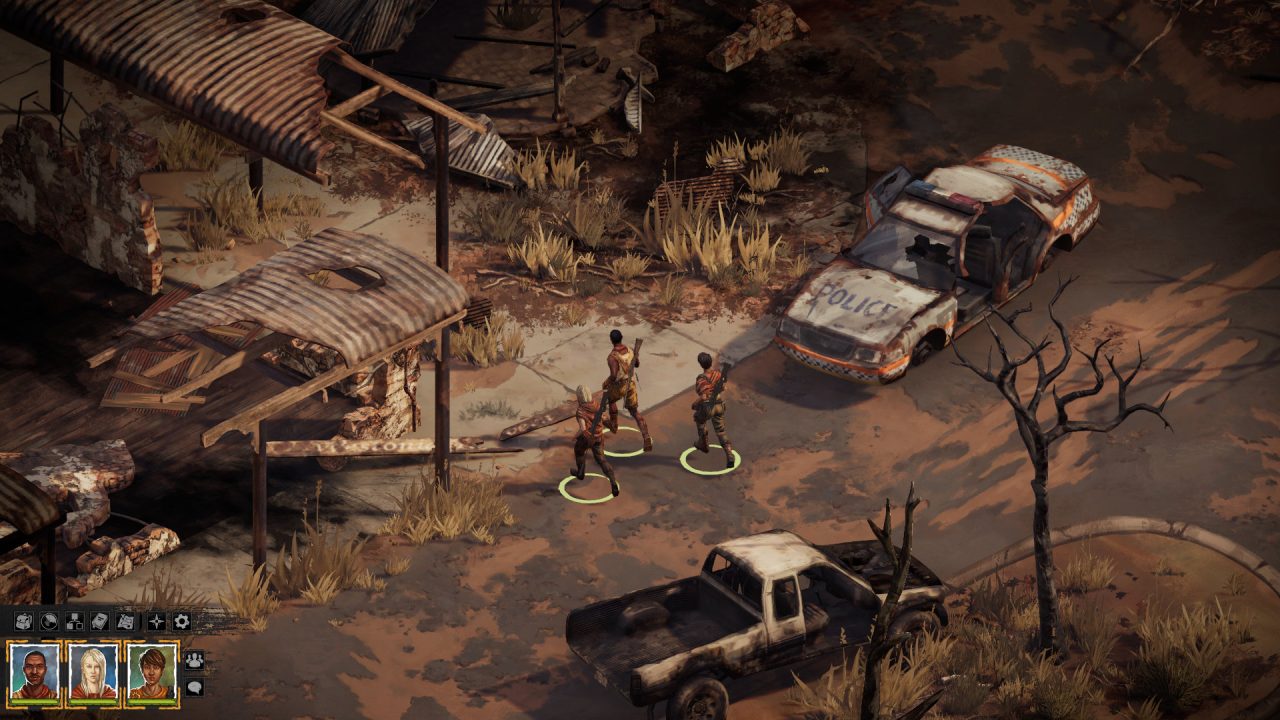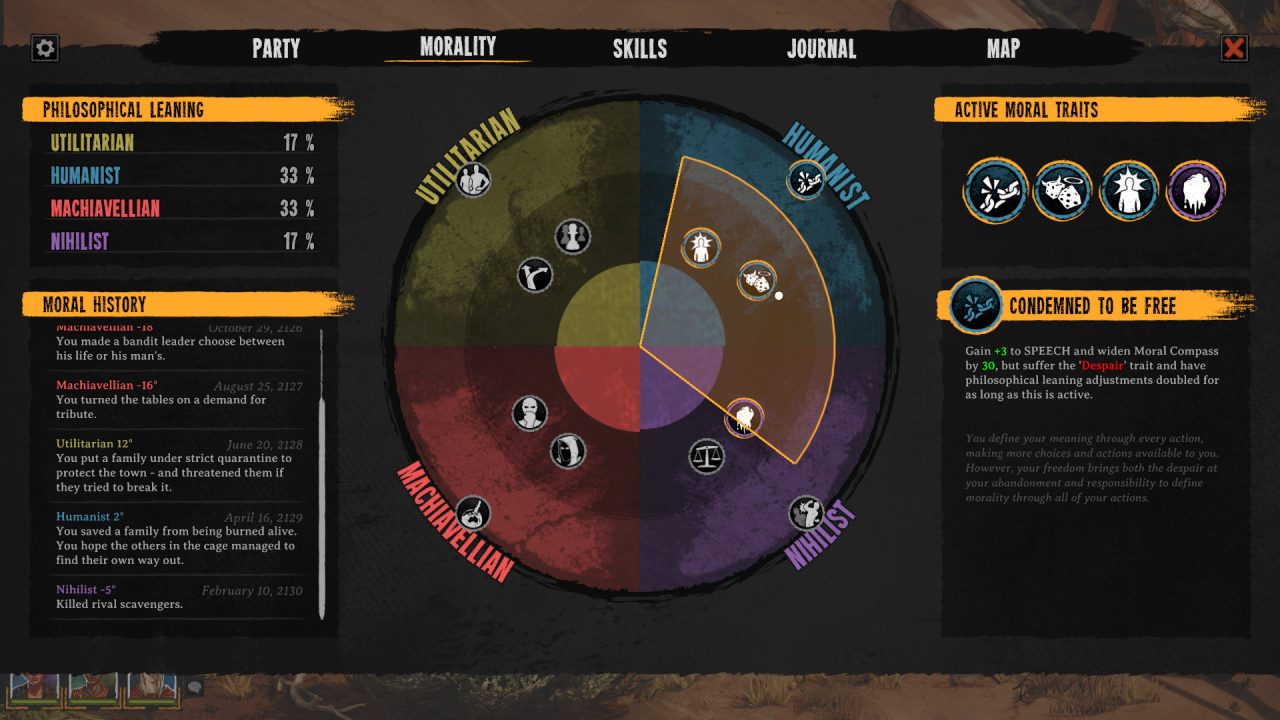Broken Roads take me home
To the place I belong
Australia, outback mama
Take me home Broken Roads
Unless you want to set the world on fire, the Fallout games don’t have the most melodious vibes. If you’re a fan of the first two entries in that series and Bethesda’s attempts to modernize it have left you feeling stranded, Broken Roads hopes to take you home but with an Aussie flair. Though you can be a straight-up brute in Fallout, Drop Bear Bytes’ new game aims to raise your intelligence stat both in the game and in your head. If you’re not well-versed in classical philosophy, don’t worry, because Broken Roads wants to give you a crash course.
Broken Roads is a CRPG, and with Fallout being the root of modern CRPGs, this game wears its inspirations on its sleeve without feeling like a direct copy. Instead of wandering through a city or region of the United States, Broken Roads is set in Australia, mate. Regardless of setting, there has to be something that caused the apocalypse in any post-apocalypse. Much like in Fallout, an existential disaster essentially hit the reset button on human society. You come in maybe a hundred years later in Australia, after societies have begun to form anew. Without all that complicated history and technology to maintain the status quo, much has changed, yet it’s stayed the same in many ways.
Broken Roads diverges from its spiritual predecessors in that it wants to get into your head, man. Think Fallout’s karma system visually tracked on a graph. You have plenty of agency in making choices, being a person of significant influence in this world. Tracking those decisions is a literal Moral Compass, which charts your worldview in four modes of thought: utilitarian, humanist, nihilist, and Machiavellian. Many of your responses affect not only how other people think of you but also how your character thinks and reacts. Before playing, you take a personality test to see which school of thought you belong to. A golden arc on your compass marks where your personality is currently sitting, and though your responses can shift the arc, you don’t have much control over it. You’re in your worldview, and breaking out of that is not easy.
It’s a realistic simulation of thought that pulls you away from your own ideas so you can understand how thought works from a bird’s-eye view. Your worldview often limits your responses to other characters, though sometimes you can sneak in an idea from the periphery of your arc. Every time you pick a dialogue response, it shifts the arc. While you can be hard set on a limited worldview, ideas are slippery things and you can eventually completely shift your mode of thought. That’s basically how thought works. People often have tunnel vision, and their beliefs are circular and self-reinforcing. But then again, there aren’t solid lines demarcating belief systems, so it’s not so weird to become influenced by something else that seems to be aligned. So, here’s where our grand thought exercise begins anyway.
Broken Roads‘ world is similar to those in other post-apocalyptic media. The Outback is mostly empty, with a few more densely populated areas. When you roam outside of towns on the big abstract map, you might encounter kangaroos, giant spiders, and unfriendly humans, all of whom want to kill you (which doesn’t seem too far removed from reality). There’s also an internal clock; some events are in constant motion where there’s a deadline for the event to happen, such as an election in one town, and some characters are independent and might not always be found in the same spot. The train is moving, so no time to be neutral. In addition to the typical marauding raiders, towns thriving off of slave labor, and soft fascism masquerading as socialism, there are a few locales where the nerdy academics (my kind of people!) have managed to build up societies with likeminded people and somehow secure themselves against the outside forces that would undo them and steal their hard work. These are the places where the best conversations happen and are one of my favorite aspects of Broken Roads.
Ultimately, this is a narrative about survival, one that shifts from survival of a group to survival of the human race to survival of society. Your part is as a nobody who gets thrown in with a group by circumstance and eventually gets roped into leadership. Some violent events force you into roaming the wilderness searching for answers. Despite Broken Roads promising a level of freedom, your story winds up being more deterministic. That’s not necessarily a bad thing for what the narrative is attempting, but it’s also something not everyone will appreciate. It’s appropriate because the story takes a deterministic view of humanity in that there will always be kind people and tyrants who clash in a reset world, cycling back toward someone deciding to reset everything all over again. The story is eventful, and I enjoyed the twists and turns, but it loses the plot when it tries to get all philosophical.
The Moral Compass works together with everything else as a sort of social experiment. At times, it’s brilliant; at others, it’s like a bad philosophy professor trying to reverse-engineer his own worldview onto his students who gets upset when they don’t see things his way. Broken Roads mimics life in general in that truly great things for humanity are within sight, yet something always stands in the way of a true breakthrough. Maybe the game wants you to feel that frustration, which is understandable, yet it still ends in frustration, which is not something anyone desires. It takes a high view of humanity, but it also takes a nasty low view which feels like the poop in the punch bowl. It reflects an ugly Reality that, while perhaps not inaccurate, isn’t something one needs to be reminded of constantly. Broken Roads should be pretty polarizing, is what I’m trying to say.
Onto something else, combat is not bad. At the beginning, it feels too limited. Similar to the old Fallout games, it’s tactical-style, though it’s never too complex. The wrinkle is that movement points and action points are separate. At first, pretty much all you can do in a turn is move once and do an action, such as attacking, once. As you level up, you’ll pick up more action points, meaning you might be able to do a couple things. Is it smarter to go for a single, more powerful ranged attack or several weaker melee attacks? Equipment is simple: Better weapons do more damage. This stuff won’t break anyone’s brain, but it’s enough to engage the mind slightly. The biggest problem is that the enemies don’t evolve at all. Early, they’re mostly too powerful for you to fight, but as you get stronger, you eventually breeze through opponents. You can often flee from fights, and completing quests nets you more experience, so you can focus on or avoid combat depending on your preference. And your companions are formidable enough to pick up any slack if your character is weak in that area.
But you’re never too weak in any one area if you don’t want to be. There are ample opportunities to completely respec your character, almost at will. While it sounds like it should feel freeing and open and tactically tasty, it was actually too easy to max out the stats I needed for any task at hand. The player character is already a blank slate anyway, but not necessitating creative solutions for problems makes it feel as though there’s nothing of substance to them at all. The companions sort of pick up the slack in the personality department as well, but as much as I wanted to learn more about them, there weren’t many opportunities to do so. There are intriguing aspects to the characters, but I would have been more interested to learn about their complexities over time rather than it all being dumped at the beginning.

Broken Roads suffers from some anti-quality-of-life features, mainly the journal. While it usually keeps track of all the information you need for the many quests available, it can cause a lot of confusion and potentially waste a lot of time when it falters. In one instance, I couldn’t for the life of me find a certain character in the area where the journal told me they would be. I wandered all over the map trying to find them. Eventually, I reloaded a past save and found I had been told how to find the character, but that information wasn’t recorded in the journal. My fault for not remembering it in the first place, but you’d think vital information wouldn’t be omitted. In another instance, a character was simply in a different location than the journal told me they would be. I wouldn’t have had a problem searching a vague area for the character, but the inconsistency made me unsure if it was a glitch or if I was missing something.
I did like the look of Broken Roads. Though it’s understated overall, there’s a hand-drawn edge to everything that gives it a well-worn appearance. A few locations are visually striking in ways that drive home their significant place in the world, especially in contrast to the typical drab post-apocalyptic environs of the rest of the world. There’s enough going on visually with the characters to enunciate their personalities. The music is similarly understated but also enjoyable. The light guitar plucking provides a chilled, pensive, and reflective mood that fits with the empty existence of this post-apocalyptic world. Voice acting is sparse, though mostly pretty good, but the narration voiceover seemed unnecessary and trying too hard to oversell the drama. Mouse and keyboard is the way to go for controls, though sometimes the icon denoting a point of interest is off or nonfunctional, which is frustrating at times.
Overall, the ways Broken Roads challenged me were fascinating and frustrating, sometimes simultaneously. It definitely won’t be everyone’s cup of tea, though I suspect some will adore it. If you’re the reflective type, it’s sure to get the gears turning. If nothing else, it’s much cheaper than taking Philosophy 101 at a university.




